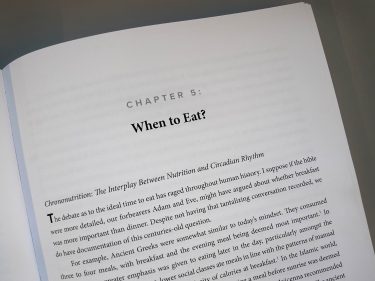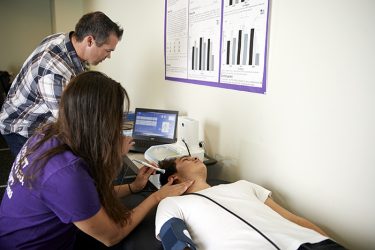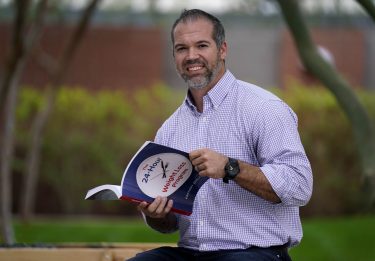
Story by Lana Sweeten-Shults
Photos by Ralph Freso
GCU News Bureau
As it turns out, timing is everything, even when it comes to weight loss.
Dr. Zach Zeigler, Associate Professor of Exercise Physiology and Nutrition at Grand Canyon University, said the big take-away from his new book, “The 24-Hour Weight Loss Program,” is this: It isn’t just about what you eat or what kinds of exercises you do, it’s also about when you eat and when you exercise.
What?
Mind blown.
“You need to really think of your body and how it was built to function over the course of a 24-hour day,” Zeigler said of the book, which he cautions isn’t referring to losing weight in a day but timing your activities over those 24 hours for the maximum weight-loss benefits.

The hefty tome (available in multiple locations; here are the links for Amazon and Target) is unique in that it doesn’t just include the traditional information-packed chapters but gets a boost from an accompanying weight-loss planner for readers to fill out so they can strategize, be intentional and, in the end, have the tools they need to be successful.
“That’s why the planner is part of the book," he said. "It’s based on eating and exercising at the right times of day.”
The big buzzword right now in the weight-loss world, Zeigler added, is “chrononutrition,” the study of how nutrition relates to the body’s circadian rhythm, or its internal clock, and how timing your meals and your exercise sessions to jibe with your body’s natural rhythms will mean greater weight loss.
Historically, humans have eaten in the daytime and slept at night, so our bodies produce hormones at certain times of day to align with those needs.
Modern times have changed all that.
Humans are staying up later to watch TV or sports events or to work the nightshift, all prime activities for ill-advised late-night snacking, by the way.
Those kinds of activities mean throwing the body’s natural rhythms out of whack.
“Chrononutrition … that’s kind of the science of this,” Zeigler said of the core of his book, which is chockful of the kind of academic studies that have made him one of the researchers-to-watch in the College of Science, Engineering and Technology.
For example, Zeigler in his book notes a 2013 study published in Obesity in which researchers divided 90 women into two weight-loss groups. Each group ate the same 1,400-calorie diet with similar amounts of carbs, proteins and fats. One group ate most of their calories, 700 of them, at breakfast. The other loaded half of their calories at dinnertime.
By the end of 12 weeks, the group that ate most of their calories for breakfast lost approximately 13 more pounds than the group that ate bigger dinners. Those who ate larger breakfasts also lost more abdominal fat, saw superior glucose and insulin reductions, and had higher satiety and lower hunger scores.
He references another study published in 2014 in the Journal of Human Nutrition and Dietetics that demonstrated that people who consumed more than 33% of their daily energy intake in the evening were twice more likely to be obese than big morning eaters. And, in a study conducted in Zeigler’s own lab at GCU, his team found that roughly 25% of people gained weight during the pandemic self-quarantine, and the most significant predictor of that weight gain was snacking after dinner.

Another weight-loss buzzword: intermittent fasting. One of the end-of-chapter take-aways in the book (each chapter includes a take-home message) is to “skip the breakfast, make lunch the most important meal of the day, and ensure it is before 3 p.m. Skipping breakfast allows for daily ‘mini-fasts’ that cause increased fat burning.”
Zeigler said, “We do use intermittent fasting, but the idea is, when you break your fast, that’s your main meal. Then you’re moving to eat a smaller portion at dinner because of the way the body metabolizes that later in the day.”
Not only is timing important in weight loss when it comes to eating, it’s also important when it comes to exercise.
Zeigler points to a research study published in 2020 in the International Journal of Obesity in which participants in a supervised exercise intervention were free to choose when they wanted to exercise. At the end of the 10 weeks, the group that exercised in the morning lost significantly more body weight and body fat even though all groups did the same amount of exercise.
He also emphasized that weight loss is so much more than diet and exercise.
“Diet may be one spring, exercise another, sleep another, stress another, and so on,” he writes, and touches on sleep, stress and gut health as weight factors.
Some other interesting information from the book:
- Body fat is actually an active endocrine organ that differs from other organs because it is the only one with unlimited growth potential at any stage of life.
- Body fat releases different hormones, based on the time of day.
- The body uses fat for energy earlier in the day and wants to store fat later in the day.
- There are three kinds of body fat: white (used for energy production), brown (used for heat production) and beige (which behaves much like brown fat).
- Metabolism is actually higher at night.
It was important to Zeigler to write “The 24-Hour Weight Loss Program,” he said, because people would come up to him and ask him for advice.
“They would say, ‘Well, Zach, what do you think I should do as far as a diet or exercise to help me lose weight?’”
It wasn’t something he could answer in a short conversation.
In 2018, Zeigler published “The Weight Loss Bible,” which was a more scientific approach to losing weight and keeping it off. It was meant to be used in conjunction with Zeigler’s classes at GCU.
“After I published that book, I wanted to make one where I could just give it to somebody and have confidence that the general person could understand the information and be successful,” he said.
Not that the book still isn’t packed with plenty of science. It is.

It also includes the book’s secret sauce, the day planner so that readers can take the information Zeigler presents and apply them. The planner includes space for the reader to write down their daily weight, steps and water intake; daily goals; proactive statements to live by; and an exercise and meal planner (with spaces shaded to represent times to avoid eating); a daily reflection; and mindfulness activities.
Zeigler himself hasn’t struggled with obesity since he was a teenager.
He was just 14 years old, and about 30 pounds overweight, when he became fascinated with weightlifting and competed in powerlifting in high school (and after high school, body building). Since then, he said he hasn’t missed a day of exercise, except for Sundays when he rests. He also makes sure he’s in bed by 9:30 p.m. and up by 4:30 a.m.
Zeigler, who ran an obesity/weight-loss clinic before his time at GCU, said he ultimately wants to help people get healthier.
There is no secret supplement that will help you lose massive amounts of weight, and fad diets are unsustainable. It takes prioritizing your weight-loss goals. It takes purpose. It takes planning, he said.
According to statistics referenced in his book, 36% of adults in the United States are considered obese. Approximately half of the country is dieting at any given time. Of those who do lose weight, anywhere from 80% to 95% are not able to sustain it.
“Weight loss is so big, and it’s so important, and so many people do have problems with those things,” Zeigler said. “Researching something that is relevant to almost everybody, it feels good because you can help. Sixty percent of the population wants to lose weight. It’s great to be able to produce something that can help them actually do that.”
GCU senior writer Lana Sweeten-Shults can be reached at [email protected] or at 602-639-7901.
****
Where to get the book:
It’s available from multiple sites, but here are a couple: Click here to buy the book on Amazon and here for Target.
***
Related content:
GCU Today: CSET professor scales weight-loss conundrum















